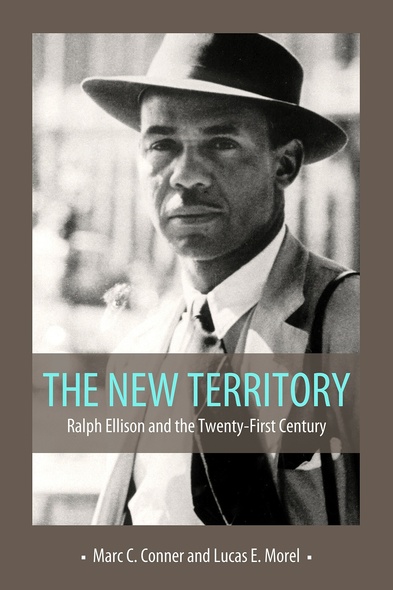
The New Territory
Ralph Ellison and the Twenty-First Century
Contributions by Herman Beavers, Robert Butler, John Callahan, Marc C. Conner, Bryan Crable, Steven D. Ealy, Lena Hill, Lucas E. Morel, Timothy Parrish, Ross Posnock, Patrice Rankine, Grant Shreve, Eric J. Sundquist, and Steven E. Tracy
Ralph Ellison once said, “We’re only a partially achieved nation.” In The New Territory, scholars show how clearly Ellison foresaw and articulated both the challenges and the possibilities of America in the twenty-first century. Indeed, Ellison in these new essays appears more and more to be a cultural prophet of twenty-first century America. As literary scholar Ross Posnock states, “If in our global, transnational age the renewed promise of cosmopolitan democracy has emerged as an animating ideal of popular political, and academic culture, this is a way of saying that we are only now beginning to catch up with Ralph Waldo Ellison.”
In this collection, the editors offer fourteen original essays that seek to examine and re-examine Ellison’s life and work in the context of its meanings for our own age, the early twenty-first century, the age of Obama, a period that is seemingly post-racial and yet all too acutely racial.
Following a careful introduction that situates Ellison’s writings in the context of new approaches and interest in his work, the book offers new essays examining Ellison’s 1952 masterpiece, Invisible Man. It then turns to his vast, unfinished second novel, Three Days Before the Shooting . . . , with detailed readings of that powerful and elusive narrative. These essays are the first sustained treatments of that posthumous work. The New Territory concludes with five chapters that discuss Ellison’s political, cultural, and historical significance, probing how he speaks to the contemporary moment and beyond.
The fourteen essays in this timely, comprehensive collection deliver exactly what editors Marc C. Conner and Lucas E. Morel promise: a thorough and penetrating assessment of Ellison’s relevance to American life and letters in the twenty-first century. Capping a decade and a half of resurgent interest in Ellison’s work, with expertly curated sections on Invisible Man, Three Days Before the Shooting. . ., and the significance of Ellison for American culture and politics, The New Territory: Ralph Ellison and the Twenty-First Century offers an indispensable guide to the complex legacy of one of our greatest writers. This book could not have arrived at a more fitting moment.
At a time when our nation is severely divided along ideological lines of race, class, and gender, a moment when ‘blood thinking' threatens the very fabric of society, and shared values seem to be a relic of our past, we need more than ever before a deepening in the twenty-first century of our appreciation for Ralph Ellison’s multifaceted and inspiring vision of the American experiment in democracy. The fourteen articles in this superb, seminal, and comprehensive assessment of Ellison’s enduring significance make it clear that the diverse works by the author of Invisible Man and Three Days Before the Shooting. . . are not just contributions that enriched literature but now are cultural artifacts as essential for understanding the complex American spirit as writings by Emerson, Faulkner, and Barack Obama. The New Territory, as scholarship, places Ellison where he properly belongs—at the pinnacle of our ongoing meditation on the meaning and the promise of America.
Marc C. Conner is Ballengee Professor of English and provost at Washington and Lee University. He is editor of The Aesthetics of Toni Morrison: Speaking the Unspeakable andcoeditor with William R. Nash of Charles Johnson: The Novelist as Philosopher, both published by University Press of Mississippi. He is also editor of The Poetry of James Joyce Reconsidered and coeditor with R. Barton Palmer of Screening Modern Irish Fiction and Drama and with John Callahan of The Selected Letters of Ralph Ellison. He is a founding member of the Ralph Ellison Society. Lucas E. Morel is professor of politics and head of the Politics Department at Washington and Lee University. He is editor of Ralph Ellison and the Raft of Hope: A Political Companion to “Invisible Man” and Lincoln and Liberty: Wisdom for the Agesand author of Lincoln’s Sacred Effort: Defining Religion’s Role in American Self-Government.





